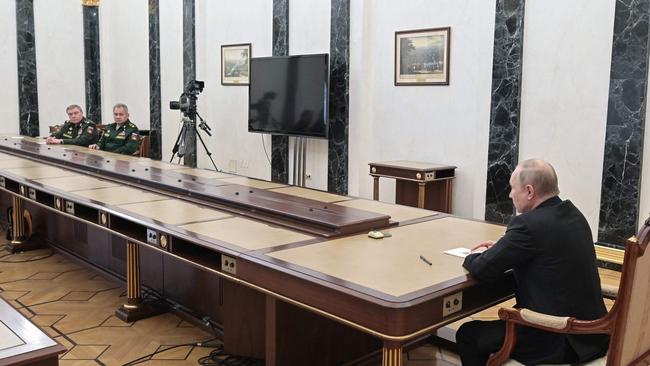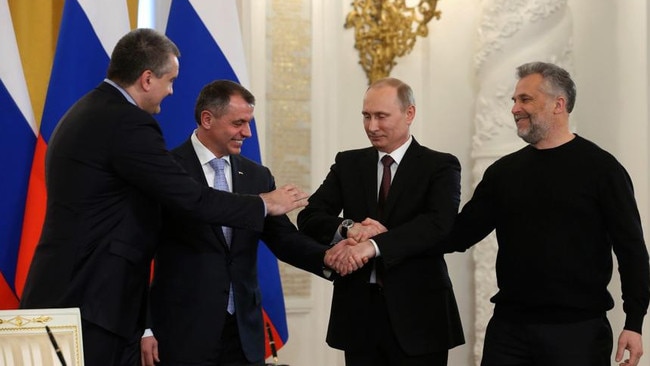Putin is losing Ukraine’s war of the mind
A military strategy based on fooling, baffling and bullying cities into backing Russia has been tested in reality and failed.
Ancient Chinese rulers turned to the philosopher Sun Tzu for military guidance. Carl von Clausewitz developed a theory of war that influenced Prussian military thinking for a century. Hitler had Erwin Rommel, the “Desert Fox”, and Churchill had Monty – military strategists whose ideas shaped the course of conflict.
And President Vladimir Putin has General Valery Vasilyevich Gerasimov, chief of the general staff of Russia’s armed forces, deputy defence minister, and a veteran of the Chechen and Syrian wars. A 66-year-old bulldog-faced Tatar from Kazan, Gerasimov was pictured sitting alongside Defence Minister Sergei Shoigu when Putin issued his campaign orders. Just a few weeks earlier, Gerasimov had publicly declared: “Information about Russia’s alleged impending invasion of Ukraine is a lie.”

Gerasimov (not to be confused with Vitaly Gerasimov, one of several Russian generals reportedly killed in the conflict) is widely credited with planning and executing the invasion of Ukraine.
He may look like a nightclub bouncer poured into cardboard uniform, but he is Russia’s foremost military strategist.
Just as the “Brezhnev doctrine” led Russia to war in Afghanistan, now the so-called Gerasimov doctrine underpins Putin’s war in Ukraine.
Central to Gerasimov’s doctrine is the concept of “new generation warfare”, a Russian theory of unconventional combat that uses psychological techniques as well as conventional weapons to destroy the enemy, emphasising non-military means to achieve political and strategic goals. In the words of Janis Berzins, an analyst at Latvia’s national defence academy, “the Russian view of modern warfare is based on the idea that the main battlespace is the mind”.
Russian psychological shock troops were operating inside Ukraine long before the invasion. Last week, The Times reported that Ukrainian intelligence had intercepted signals indicating the “652nd Information and Psychological Operations Group” was in the occupied city of Kherson, north of Crimea. This unit, part of the Federal Security Service (FSB), successor to the KGB, is secretly propagating fake news, installing pliable local officials, spreading disinformation and generally trying to fool, baffle and bully the city’s inhabitants into supporting Russia. The aim of this covert psychological warfare, as the Ukrainian intelligence report puts it, is to create “another pseudo-republic in (the) Kherson region”.
Russia’s psychological operations, or “psyops”, are highly sophisticated and extravagantly funded. But they are not working. Putin appears to be losing the mind war in Ukraine, as well as the one on the ground.
Gerasimov laid out the central elements of his doctrine in a speech to the Russian academy of military sciences in 2013, describing the country’s new “nonlinear” approach to modern warfare. In a deliberate reversal of the distinction made by Tolstoy in War and Peace, he said: “In the 21st century, we see a tendency toward blurring the lines between the states of war and peace. Wars are no longer declared, and once begun, proceed according to an unfamiliar template”. Russia is waging war in Ukraine, without declaring one.
Gerasimov described how subversion, disinformation and sabotage can create a situation very similar to what is being attempted in Ukraine: “A perfectly thriving state can, in a matter of months and even days, be transformed into an arena of fierce armed conflict and later become the victim of foreign intervention and sink into a web of chaos, humanitarian disaster and civil war.”
The annexation of Crimea in 2014 appeared to demonstrate the effectiveness of new-generation warfare. After blocking Ukrainian troops in their bases, Russia deployed bribery, intimidation, deception, media propaganda and information control to undermine resistance, depress the civilian population and erode the morale of the armed forces.

In the West such techniques are often described as “hybrid”, combining conventional and unconventional weapons, regular and irregular troops, overt and covert methods, both physical and in cyberspace. This kind of warfare uses various non-military tools, including political pressure, socio-economic levers and, above all, media manipulation to degrade an adversary, in peacetime as well as in time of open war.
Such techniques have a long and grim history in Russia. Units such as the FSB’s 652nd psyops group are direct successors of the KGB’s “active measures” department, which deployed subversion, disinformation, forgery, political warfare, media manipulation and foreign election-rigging throughout the Cold War.
At the KGB’s Andropov Institute, from which Putin graduated in 1985, Russian spies were taught to spread fabricated news, disrupt Western democracy and foment discord among NATO allies by stirring racial tension, subsidising subversion and spreading rumours. Active measures was described by former KGB general Oleg Kalugin as “the heart and soul of Soviet intelligence”.
Russia’s agents of disruption and disinformation are undoubtedly active inside Ukraine. But just as certainly, they are not having the desired effect. Colonel General Sergey Beseda, head of the FSB’s foreign intelligence branch, was responsible for building pro-Russian sentiment and establishing fifth columnists in Ukraine. He appears to have assured Putin the invasion would be a walkover. Beseda and his deputy were arrested two weeks ago.
Far from bowing to the invaders, the citizens of Kherson are mounting anti-Russian protests almost daily after a month of occupation.
A fortnight ago, Ukrainian intelligence reported the interception of another highly significant message: Russian officials had “severely reprimanded” the head of the 652nd psyops unit for his “weak efforts” and inability to create a “Kherson People’s Republic”.
And what of the man whose name attaches to this new, but so far ineffective form of warfare? A week ago, he appeared in a brief undated video clip to counter speculation that he was in disgrace. General Gerasimov has not been seen since.
The Times


To join the conversation, please log in. Don't have an account? Register
Join the conversation, you are commenting as Logout